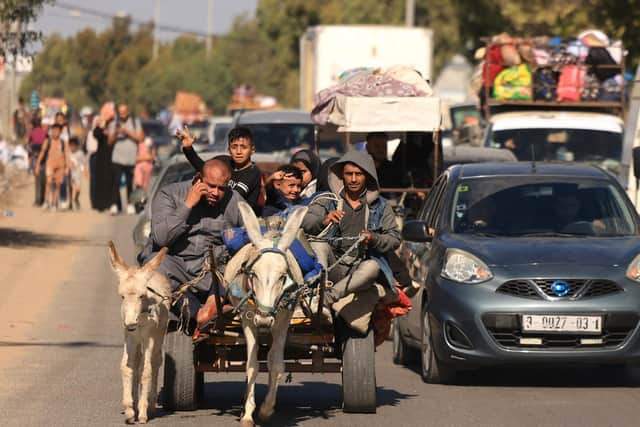Humanitarian fears as Israel orders mass evacuation in Gaza
Israel continued to mass soldiers near its border with Gaza on Friday ahead of an expected ground offensive in its ongoing and bloody conflict with Hamas, with the United Nations warning of “devastating humanitarian consequences” after more than a million residents in the densely populated region were given 24 hours to flee south.
Panicked civilians in Gaza took to its main highway, with many seeking to escape on foot or donkey-drawn carts, after the Israeli military warned them to “immediately” leave the blockaded territory’s main city, stressing that the evacuation order was for their own safety as the war continued to rage.
Advertisement
Hide AdAdvertisement
Hide AdBut there are rapidly escalating concerns that the order will intensify the suffering and loss of life in Gaza. Already, more than nearly 1,800 people have died following a heavy campaign of airstrikes, according to the health ministry, and fuel, food, and water are in short supply as a consequence of Israeli-imposed restrictions.
Both the UN and the World Health Organisation (WHO) have criticised Israel’s demand, which covers almost half of Gaza’s 2.3 million inhabitants. Stéphane Dujarric, the spokesman for UN secretary-general, António Guterres, said it was “impossible for such a movement to take place without devastating humanitarian consequences,” and appealed for the order to be rescinded so as to avoid turning “what is already a tragedy into a calamitous situation.”
Philippe Lazzarini, commissioner general of the UN agency for Palestinian refugees (UNRWA), echoed calls for civilians to be afforded protection. He said that Gaza was “fast becoming a hellhole and is on the brink of collapse,” and that the evacuation would only make matters worse.
“The scale and speed of the unfolding humanitarian crisis in Gaza is bone-chilling,” he explained. “This will only lead to unprecedented levels of misery and further push people in Gaza into [the] abyss.”
Tarik Jašarević, a WHO spokesman, said local health authorities in Gaza had informed its officials it was impossible to evacuate vulnerable hospital patients from northern Gaza within 24 hours. “There are severely ill people whose injuries mean their only chances of survival is being on life support, such as mechanical ventilators,” he said.


The mass exodus order, which saw the Israeli Defence Forces (IDF) drop flyers written in Arabic over Gaza, urging people to move across the Wadi Gaza, is seen as the strongest indication yet that Israel is preparing for a ground assault on the besieged city. Any such offensive would represent a significant escalation in its response to the brutal wave of attacks carried out by Hamas since last Saturday that have claimed the lives of around 1,300 people.
Israel has also traded fire in recent days around its northern border with Lebanon's Hezbollah militant group, sparking fears of an ever wider conflict. Iran’s foreign minister, Hossein Amirabdollahian, has described Israel’s recent military strikes on Gaza as “war crimes,” and warned of a “response from the rest of the axis” should they continue.
Given the mobilisation efforts underway around Gaza, such threats look unlikely to deter Israel from upping its efforts against Hamas. Outlining the reasons for the evacuation order, the Israeli military said it needed to target Hamas' infrastructure, much of which is buried deep underground.
Advertisement
Hide AdAdvertisement
Hide AdSpeaking at a news conference alongside US defence secretary, Lloyd Austin, Israeli defence minister, Yoav Gallant, described the civilian population in Gaza as “the camouflage of the terrorists,” adding: “We need to separate them. So those who want to save their life, please go south.”
Lieutenant Colonel Jonathan Conricus, an international spokesman for the IDF, said the military would take “extensive efforts to avoid harming civilians,” and that residents would be allowed to return when the war is over. But Hamas, the ruling militant group in Gaza, dismissed the evacuation order as “psychological warfare,” and called on people to stay in their homes.
But according to the Palestinian news agency, WAFA, Palestinian president, Mahmoud Abbas, has told US secretary of state, Antony Blinken, that he "rejects the forced displacement" of Palestinians in Gaza, and that such an event would amount to a “second Nakba” - a reference to the mass displacement of Palestinians in 1948.
The order did little to allay fears and panic among civilians and aid workers in Gaza on Friday. Nebal Farsakh, a spokeswoman for the Palestinian Red Crescent in Gaza City, said: “Forget about food, forget about electricity, forget about fuel. The only concern now is just if you'll make it, if you're going to live.”
Gaza City resident Khaled Abu Sultan said at first he didn't believe the evacuation order was real, and was unsure whether to evacuate his family to the south. “We don't know if there are safe areas there,” he said. “We don't know anything.”
Gaza's health ministry said it was impossible to evacuate the many wounded from hospitals already struggling with high numbers of dead and injured. Ms Farsakh said some doctors were refusing to abandon their patients, and were instead calling their colleagues to say goodbye.
Mr Dujarric said the evacuation order applied to all UN staff and those sheltered in UN facilities, including schools, health centres and clinics. UNRWA is helping more than 60 per cent of the 423,000 people displaced in recent days in Gaza. It said it would not evacuate the schools where many had taken shelter, but according to its spokeswoman, Juliette Touma, the agency has relocated its headquarters to southern Gaza.
Meanwhile, Hamas continued to launch a barrage of rocket strikes against Israel on Friday. The group said it fired a missile at Safed, a city in the far north of the country, although Daniel Hagari, an IDF spokesman, said the attack had been intercepted. Hamas also claimed to have fired more rockets at Ashkelon, Sderot and Be'eri, all towns in the south of Israel.
Comments
Want to join the conversation? Please or to comment on this article.